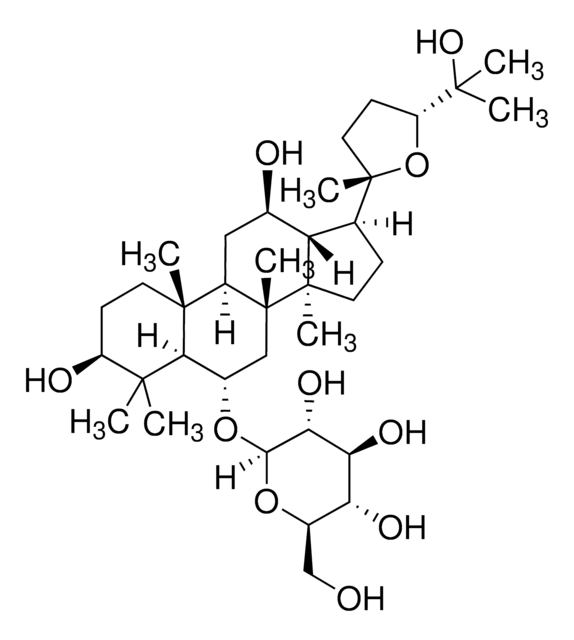QBD10850
Thiol-dPEG®12-acid
>95% (HPLC)
Synonym(s):
CT(PEG)12, Carboxy-PEG-Thiol, Carboxy-PEG12-Thiol, HS-PEG12-COOH, Thiol-PEG12-acid
Sign Into View Organizational & Contract Pricing
All Photos(1)
About This Item
Empirical Formula (Hill Notation):
C27H54O14S
Molecular Weight:
634.77
MDL number:
UNSPSC Code:
12162002
NACRES:
NA.22
Recommended Products
Assay
>95% (HPLC)
form
solid or viscous liquid
reaction suitability
reaction type: Pegylations
polymer architecture
shape: linear
functionality: heterobifunctional
shipped in
ambient
storage temp.
−20°C
Features and Benefits
Thiol-dPEG12-acid is a single molecular weight, discrete-length polyethylene glycol (dPEG) crosslinking PEGylation reagent. One end of the crosslinker terminates in a sulfhydryl (thiol) group. Propionic acid terminates the opposite end. The thiol end of the molecule forms dative bonds with gold. Moreover, it forms thioether bonds with maleimide and bromoacetate groups and disulfide bonds with other sulfhydryl groups. The propionic acid group reacts with amines to form amide bonds. Alternatively, if it is left unreacted, the propionic acid group provides a negative charge to the conjugated molecule or modified surface. The monodispersed dPEG spacer is 39 atoms (46.8 Å) long.
Legal Information
Products Protected under U.S. Patent #s 7,888,536 & 8,637,711 and European Patent #s 1,594,440 & 2,750,681
dPEG is a registered trademark of Quanta BioDesign
Storage Class Code
11 - Combustible Solids
WGK
WGK 3
Flash Point(F)
Not applicable
Flash Point(C)
Not applicable
Choose from one of the most recent versions:
Certificates of Analysis (COA)
Lot/Batch Number
Sorry, we don't have COAs for this product available online at this time.
If you need assistance, please contact Customer Support.
Already Own This Product?
Find documentation for the products that you have recently purchased in the Document Library.
Yung-Chieh Chan et al.
ACS omega, 3(2), 1627-1634 (2018-07-20)
The matrix metalloproteinases (MMPs) are well-known mediators that are activated in tumor progression. MMP2 is a kind of gelatinase in extracellular matrix remodeling and cancer metastasis processes. MMP2 secretion increased in many types of cancer diseases, and its abnormal expression
Elizabeth R Figueroa et al.
Journal of nanobiotechnology, 14, 24-24 (2016-04-01)
Gold nanoparticles (AuNPs) have shown great promise as scaffolds for gene therapy vectors due to their attractive physiochemical properties which include biocompatibility, ease of functionalization via the nearly covalent gold-sulfur dative bond, and surface plasmon optical properties. Previously, we synthesized
Our team of scientists has experience in all areas of research including Life Science, Material Science, Chemical Synthesis, Chromatography, Analytical and many others.
Contact Technical Service


![O-(3-Carboxypropyl)-O′-[2-(3-mercaptopropionylamino)ethyl]-polyethylene glycol Mw 3000](/deepweb/assets/sigmaaldrich/product/structures/271/277/d02536f0-83d7-4416-9cea-f6213e09fe85/640/d02536f0-83d7-4416-9cea-f6213e09fe85.png)




